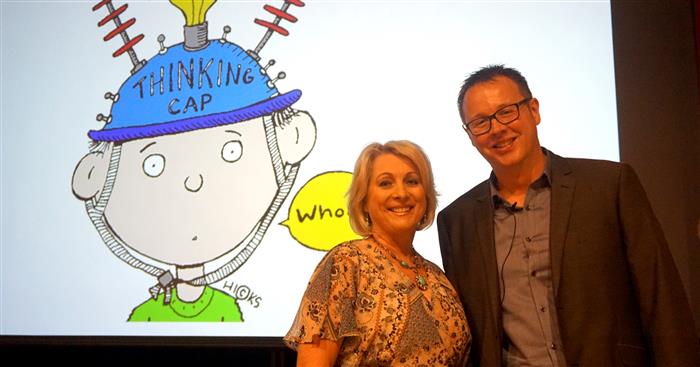Teachers chart paths to deeper thinking

Wenona School teachers began Term 2 with a professional development day that explored ways to build a culture of reflection and help students actively seek feedback.
Educator and guest speaker Simon Brooks emphasised the role of metacognition – an awareness of one’s own though process – in deep learning.
The former English teacher has held leadership roles in government and independent schools in Australia and the United Kingdom and is also a fellow of the Harvard Graduate School of Education’s Project Zero Institute. The project was founded in 1967 to improve education in the arts and has since expanded to include research on the nature of intelligence, thinking, creativity, understanding and ethics.
Through this lens Mr Brooks approached the topic of how to help students seek meaningful feedback, and develop to become curious, open-minded, imaginative, strategic, responsible, empathetic and diligent.
His talk was followed by smaller group workshops on the areas of reflection, metacognition and feedback as they applied to areas including Science, Technology, Engineering and Mathematics (STEM) and the Arts.
Placing students’ brainstorming about a topic on the walls for the duration of each unit of study was suggested as a ready-made opportunity to for them to reflect on how their thinking has changed. Another was the question: "What makes you say that?"
“If we are to build a culture of thinking, specifically metacognition and reflection, we need to create as many opportunities as possible for students’ thinking to be visible,” Mr Brooks said.
“It’s can be challenging for students to reflect on how their understanding has developed when they can’t remember what their understanding used to be because they have been immersed in that learning experience.”
In one exercise, teachers took on the role of Year 10 students in a History class that was asked to reflect for the whole lesson on a 1939 photograph of German Security Service soldiers conducting a staged raid in Warsaw as it was revealed to them piece-by-piece.
The activity demonstrated how to draw students into thinking more deeply and explain their thought process along the way. It also brought forward the challenge of allowing time for deeper reflection in lessons while covering large swathes of content.
“Every time a teacher teaches they make a choice about how they are going to use time,” Mr Brooks said. “In making our choices about time we send messages to children about what the culture of our classroom is.
“If we choose to be lecturing all the time because we have to get through the content, then the children will receive the message that their role is to be passive recipients of content and not to be thinkers. The question we need to ask ourselves is do we want to make that choice as teachers?”
Photo: Wenona Professional Learning Coach Andrea Stringa and presenter Simon Brooks acknowledge the importance of reflection and feedback.